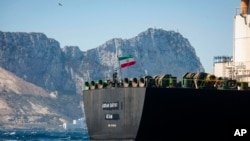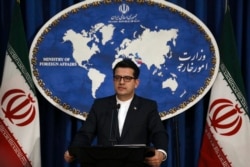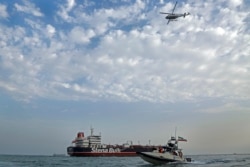Last updated on Aug. 19, 2019 at 1:30p.m.
An Iranian oil tanker seized in Gibraltar for violating European Union sanctions sailed toward Greece on Monday after repeated U.S. requests to detain the ship were rejected.
Marine traffic monitoring data indicated Monday the tanker – with its named changed from Grace 1 to Adrian Darya 1 – was making its way to the Kalamata port in Greece, on track to arrive next Sunday, though officials have not publicly confirmed its destination.
Iran warned the U.S. that any action to seize the ship, filled with 2.1 million barrels of light crude oil worth $130 million, would result in "heavy consequences."
But Foreign Minister Mohammad Javad Zarif also said that while Iran believes the U.S. is seeking "more escalation" with Iran, the Islamic Republic is "happy this ordeal (over the oil tanker) has ended and I hope this will lead to less escalation."
Gibraltar, an overseas British territory, had seized the vessel July 4, believing it was headed to Syria, an Iranian ally, in violation of EU sanctions. It is unclear what happens to the oil if the ship docks in Greece, or whether Iran will release the British-flagged Stena Impero, which it seized in late July after the Gibraltar takeover of the Grace 1.
Gibraltar said Iran had assured it in writing that the oil would not be shipped to Syria, a pledge that led to the release of the ship.
Zarif said Iran was being non-committal about the eventual destination of the oil because he said the U.S. "illegally tries to bully others from purchasing our oil."
The Gibraltar government said it had received a "supplemental request" from the United States as late as Saturday to stop the tanker from leaving Gibraltar waters, where it had been anchored for 46 days. But Gibraltar authorities were "unable to seek a Supreme Court Order to provide the restraining assistance (the U.S.) requested," the statement said.
Initial U.S. requests to hold the vessel were rejected by Gibraltar's high court last Thursday. The colony's chief minister Fabian Picardo said that Iran had given assurances that the oil would not go to Syria, a destination prohibited by EU sanctions against the government of Bashar al-Assad.
Subsequent U.S. requests were based on offenses under the International Emergency Economic Powers Act linked to U.S. sanctions against Iran that do not apply in Gibraltar, Britain or the rest of the EU, according to the Gibraltar Justice Ministry.
Iranian Foreign Ministry spokesman Abbas Mousavi told reporters Monday that Iran had warned the United States through official channels against making any new attempt to seize the tanker.
U.S. pressures were also exerted directly on the British government by top Trump administration officials including National Security Adviser John Bolton who flew to London last week.
"There is no embargo policy against Iran in EU countries," said Gibraltar attorney Joseph Triay. He said that the ship should have been allowed to sail last week.
Sources close to the Gibraltar attorney general's office say that the United States alleged that proceeds from the tanker's oil deliveries were going to companies associated with Iran's Revolutionary Guard, which the U.S. State Department recently designated as a terrorist organization.
Some analysts say the tanker's release could also be the start of an exchange with the Iranian government, which seized the Stena Impero as it entered the Persian Gulf last month. Iran's Guardian Council spokesman Abbas Ali Kadkhodaei has called the ship's boarding by the Revolutionary Guard a "reciprocal move."
"There is much speculation that the release of Grace 1 is a pre-condition for the Iranian regime to release the British ship Stena Impero," said Benjamin Weinthal of the Washington-based Foundation for Defense of Democracies.
'Escalation of tensions'
The seizure of yet another British tanker was narrowly averted by a Royal Navy frigate that blocked three Iranian patrol boats approaching the vessel. Britain's Foreign Office called the incident an "escalation of tensions."
The Royal Navy announced that it was reinforcing its presence in the Persian Gulf with a destroyer diverted from NATO duties in the Black Sea, leaving it with two warships in the Gulf area.
American defense journalist David Axe says the Royal Navy is too "overstretched" to effectively protect the volume of British tanker traffic moving through the Strait of Hormuz.
The United States has an aircraft carrier task force deployed in the Gulf to protect its shipping interests.
The British Foreign Office refuses to link the seizing of the Stena Impero with that of the Adrian Darya 1 and denies that any negotiations are underway with Tehran.
But last week, an Iranian port official said that documents were being exchanged between London and Tehran which indicated that the "problem would be resolved in the near future."







